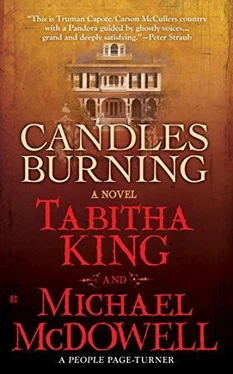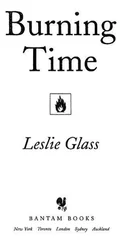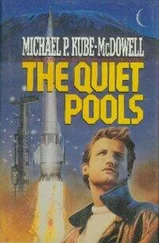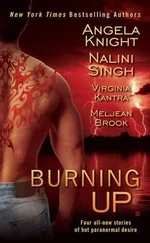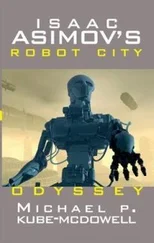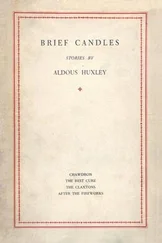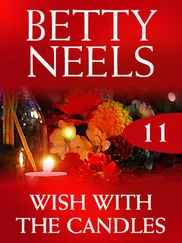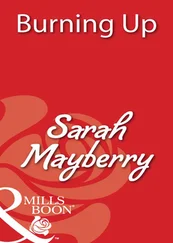“Tansy, where?”
Tansy reached out and touched the tip of my nose. “What you done to your hair, gurl?” Then she started to close the door in my face. As the door closed between us, she said, “N’awlins. Hear tell they done gone to they Quarter.”
Then the door was closed.
“Ain’t got no address, do you?” Grady called after her.
Her voice came from behind the door, as if she still stood there. “Cracker wanna know? Ah know where they gone be someday,” she said, “where’s all the rest of them Carrolls, down to Hellfire Street, care o’ Satan hisself.”
I pounded on the door. “Tansy, I ain’t done talkin’ to you, open this door.”
Amazingly, she cracked the door open wide enough to peer out at me.
“What’s Rosetta’s last name? Where’s she at?”
“She at the colored boneyard. Her girls done bought her a big stone crosst, says Rosetta Branch Shaw right on it ’n’ her dates. Mama . Real sweet.”
We didn’t say anything to each other until we were back in the Edsel.
“Dry hole,” Grady said.
“Tansy’s grave’s gone be marked with a Dead End sign,” I told him.
He laughed and then said seriously, “I caint take another day, even if she ain’t lying and we could find ’em in a place as big as N’awlins.”
“I want to see Daddy’s grave and Mamadee’s. We’d still have time to go to Montgomery and maybe find Miz Verlow’s sister, Fennie.”
He shrugged.
“After that, we make a U-turn for Pensacola, OK? By then I reckon I’ll have seen about as much of Alabama as I ever expected to,” he said.
“Let’s see that phone book again.”
“For what?”
“Check the funeral parlors. Undertakers must know all the graveyards around here.”
“That’s right smart.”
“Not that smart. If I’d thunk of it before, I could have called ahead.”
Grady grinned. “Rattle them bones, Miz Calley.”
It seemed important to keep the red Pegasus in sight from the phone booth when I called the funeral parlor with the biggest ad.
A breathless, elderly voice answered. I had to repeat my question twice, and have it repeated back to me.
Then I waited, while the phone transmitted the sounds of the elderly person moving around what was apparently quite a small office space, trying to get a file drawer open and eventually succeeding, and a rummage among paper, all while the elderly person hummed and talked to—himself, I decided.
On picking up the receiver again, he cleared his throat, a process that easily took three minutes, and had Grady in stitches when I held the phone to his ear.
“This is necessarily partial,” the elderly man warned me sternly when he finally could speak. “Country folk bury folks anywhere, you know, and call it a cemetery.” Then he read the list, haltingly and with much repetition as I asked for spellings and directions, and while he lost and found his place in the listing.
I had hoped that I would remember the name of the graveyard where Daddy was buried if I heard it but when he finished, nothing had twigged my memory. All I had, and I wasn’t sure what the use for it might be, was how to get to the Last Times Upon Us Church Cemetery where Mamadee was supposed to be interred. I wasn’t even sure that I wanted to go there.
“You reckon that old fart choke up a lung?” asked Grady. “Let’s call him up again and see if we can get him to gargle up the other one.”
At least he was entertained. He looked at the directions that I had noted down. “You recall any of this?”
I shook my head no. “Never been there, to the best of my knowledge.”
It took stopping a deputy but we did find it.
Mamadee had come down in the world, for sure. The Last Times Upon Us Church Cemetery reminded me of the one where Daddy had been buried; if anything, it was grimmer. Some kind of mineral crystal winked in the sour dirt and among the dandelions and plantain that seemed to be the only green things able to grow there. Most graveyards, somebody lays out in plots. Nobody had done that in the Last Times boneyard. It was a crazy quilt, the rectangles of the graves helter-skelter, puzzle-pieced and shoe-horned in among each other. It was a weird contrast to the grove of spindly pines behind the graveyard, for the pines, making room for themselves by acidifying the ground beneath with their dead needles, were spaced as neat as tacks on a card at the hardware store.
Grady and I wandered around the chaotic boneyard for a good forty minutes before we found the grave. The stone wasn’t even marble. It was a coarse, already cracking, cement bar set unevenly in the ground.
DEIRDRE DEXTER CAROLL
1899–1958
Grady made a face and shivered. “Cold. Brrr. She don’t even get a Bible verse or an R-I-P?”
“There’s two Rs in Carroll,” I said. “I don’t know why she hasn’t climbed back out to fix it.”
“Don’t go putting any ideas in her old daid haid, now.” Grady was not entirely joking. “I don’t see how it’s gone help find Brother Ford.”
“Me either. Less blow this pop stand. I want to go to Banks.”
“Banks? We stickin’ some up after all?”
“Banks, Alabama. It’s on the way back to Pensacola.”
“What’s in Banks? You tole me Great-gran’s house burned down years ago.”
“Might be a graveyard there.”
Grady went back to the sedan, dropped in behind the wheel and shook out the tattered old road map that he had gotten from somebody he knew at some gas station on Santa Rosa Island.
I crouched quickly, wet the end of my finger and touched the dirt of Mamadee’s grave. I tasted my fingertips. Salt.
“Banks,” he said. And after a few seconds, “Bingo. There she is. That’s not what I call dreckly back.”
“It’s only a couple hours from Pensacola.”
He could see that, of course.
“Ain’t nothin’ there, Calley. Some railroad tracks and a couple streets. Probably nothing but graveyards there, on account of ever’body ever lived there is dead. Probably anybody even stays there overnight drops dead on account of there’s so much nothin’ in Banks, Alabama, there ain’t even air.”
He had a point. Finding a house that had burned down a decade or more ago was likely to be something of a chore, never mind the grave of my maternal great-grandmama, in the hope that I would learn something from it.
“You got the right of it,” I told him. “Less gone home.”
He chucked me under the chin. “I’m sorry, Calley. I wisht we’d found your brother.”
EXPECTING to help serve and clean up supper, I entered the house by the kitchen door.
Perdita glanced up at me from arranging portions on plates. “Miz Verlow waitin’ you on the v’randah.”
As I crossed the kitchen, Cleonie came in from the dining room with an empty tray.
She held the swinging door open for me and hummed low at me as I passed. It was a hum of warning.
The guests in the dining room were forking in enthusiastically.
I paused at the front doors to listen for Miz Verlow and heard not only her but also Mrs. Mank. They were in the little alcove where Adele Starret had read Mamadee’s will to Mama.
The two women were smoking cigarettes. The beverage of choice, I saw, was bourbon, in thick crystal glasses. The decanter sat close at hand on the little table. A candle flickered next to it, providing the only light in the alcove. The amber liquid in the decanter glowed with the reflected candlelight, as if it had a small pillar of fire at its core.
The faces of the two women were shadowed. I had to draw a chair up to face them and sit before I could see them clearly.
Читать дальше
